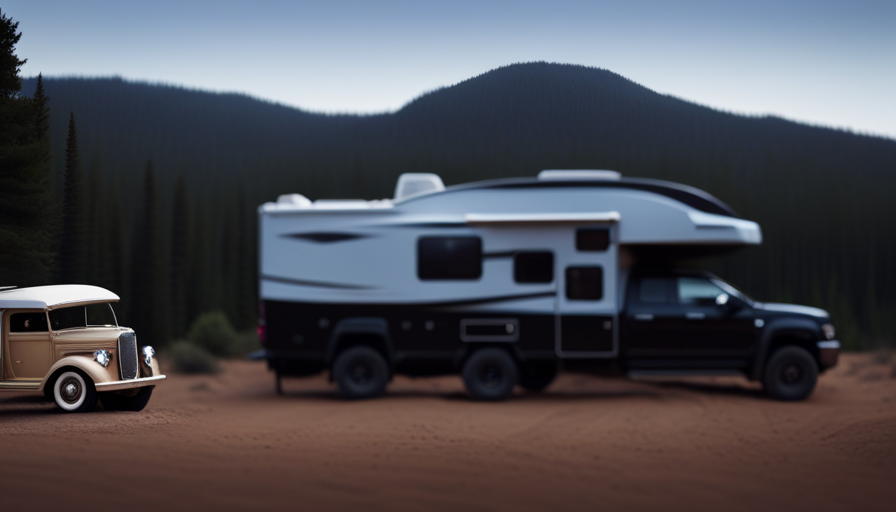As a camping enthusiast, I recognize the importance of keeping unwanted guests out of your RV. Just like a castle protects its inhabitants, it’s essential to fortify your camper against mice invading. While these tiny creatures may seem harmless, they can actually wreak havoc on your RV by chewing wires, damaging insulation, and potentially spreading diseases.
To keep mice at bay, I’m here to share with you some effective and natural home remedies that will make your camper an impenetrable fortress against these unwelcome guests. Think of these remedies as your secret weapons, like a shield that repels mice with ease.
From sealing entry points to using peppermint oil and homemade repellent sprays, you’ll be armed with the knowledge and techniques needed to keep your camper mouse-free. So let’s dive in and discover the best ways to protect your camper and enjoy a pest-free camping experience.
Key Takeaways
- Regularly seal entry points to prevent mice from accessing the camper
- Keep the camper clean and tidy to discourage mice from infesting the area
- Use natural repellents like peppermint oil, vinegar, or ammonia-soaked cotton balls to deter mice
- Consider alternative methods such as homemade traps, ultrasonic repellent devices, or using cats as natural predators to keep mice away from the camper.
Seal Entry Points to Prevent Access
You’ll want to grab some caulk and fill in any cracks or gaps around your camper, making it impossible for those sneaky mice to find their way in. Preventive measures such as sealing entry points are crucial in keeping mice out of your camper. Regular maintenance is key to ensuring that these entry points remain sealed and secure.
Start by thoroughly inspecting the exterior of your camper, paying close attention to areas where pipes, wires, or vents enter the vehicle. These are common entry points for mice. Use caulk to seal any cracks or gaps you find, ensuring a tight seal. Don’t forget to check the underside of your camper for any openings that mice might use to gain access.
In addition to sealing entry points, it’s important to keep your camper clean and tidy. Mice are attracted to food sources, so be sure to store all food in airtight containers and clean up any spills or crumbs immediately. Regularly vacuuming and sweeping your camper will help eliminate any potential nesting areas for mice.
By taking these preventive measures and practicing regular maintenance, you can effectively keep mice out of your camper. Next, we’ll discuss how to keep your camper clean and tidy, which is another important step in preventing mice infestations.
Keep Your Camper Clean and Tidy
Make sure your camper is spick and span to prevent any unwanted visitors from making themselves at home. Keeping your camper clean and tidy is essential in keeping mice away. Start by regularly cleaning and wiping down all surfaces, especially in the kitchen area where food crumbs can attract mice. Pay special attention to your camper windows and make sure they are kept clean, as mice can easily squeeze through small openings. Additionally, be diligent in organizing your storage spaces. Cluttered and messy storage areas provide hiding spots for mice, so keep everything well-organized and sealed in airtight containers.
To emphasize the importance of cleanliness and organization, here is a table that showcases the benefits of a clean and tidy camper:
| Clean and Tidy Camper | Benefits |
|---|---|
| Reduces risk of infestation | Prevents damage to belongings |
| Improves overall hygiene | Enhances peace of mind |
| Makes camper more inviting | Creates a comfortable living space |
By following these cleaning and organizing tips, you are taking proactive measures to keep mice away from your camper. In the next section, we will explore how to use peppermint oil to repel mice without the use of harmful chemicals.
Use Peppermint Oil to Repel Mice
To effectively deter mice from infiltrating your camper, try using the natural and pleasant scent of peppermint oil. Peppermint oil is a great natural mice repellent that can be easily obtained and used in your camper. Not only does it have a refreshing aroma, but it also acts as a deterrent for these unwanted critters.
One DIY alternative to using peppermint oil is to create a peppermint oil spray. Simply mix a few drops of peppermint oil with water in a spray bottle and shake well. Then, spray this mixture around the corners, crevices, and entry points of your camper. The strong scent of peppermint will repel mice and discourage them from making your camper their home.
In addition to peppermint oil, there are other natural mice repellents that you can try. For example, you can use cotton balls soaked in vinegar or ammonia and place them strategically around your camper. The strong odor of these substances will make mice think twice about entering your space.
To create a DIY mouse repellent spray, you can combine peppermint oil with other natural ingredients such as vinegar, garlic, or cayenne pepper. This powerful concoction will not only repel mice but also keep them away from your camper.
Now, let’s move on to the next section about creating a DIY mouse repellent spray without any harsh chemicals.
Create a DIY Mouse Repellent Spray
If you’re looking for a natural and effective way to keep those pesky rodents away, try creating your very own DIY mouse repellent spray. It’s a simple and cost-effective solution that can help deter mice from entering your camper.
To make the spray, you’ll need a few ingredients that are readily available in most households. Start by mixing equal parts of water and white vinegar in a spray bottle. Add a few drops of peppermint oil, as mice dislike the strong smell. Shake the bottle well to ensure all the ingredients are thoroughly combined.
Then, spray the solution around the areas where you suspect mice might enter, such as cracks, crevices, and entry points. Reapply the spray every few days or after rain to maintain its effectiveness.
In addition to the DIY mouse repellent spray, there are other alternative mouse repellents you can try. Some people have found success with using essential oils like eucalyptus, lavender, or citronella. These scents can be off-putting to mice and help keep them away. Another option is to use garlic or onion powder, as mice dislike the strong smell of these spices.
Now that you have your DIY mouse repellent spray ready, it’s time to set up homemade mouse traps to catch any mice that may already be inside your camper.
Set Up Homemade Mouse Traps
Once you’ve prepared your DIY mouse repellent spray, it’s time to get crafty and set up traps that will make those pesky critters regret ever setting foot in your camper. Homemade mouse traps can be just as effective as store-bought ones, and they offer the advantage of using materials you already have on hand. When it comes to bait options, there are several homemade alternatives that mice find irresistible. Peanut butter, cheese, and even bits of bacon can all serve as enticing bait. Experiment with different options to see what works best for you.
In addition to traditional snap traps, there are alternative trapping methods you can try. One option is the bucket trap, where a tall bucket is filled with water and a thin piece of wood or a wooden ramp is placed on the edge. Smear some bait on the ramp, and when the mouse tries to reach it, it will fall into the water and be unable to escape. Another alternative is the rolling log trap, where a cylindrical object is placed on a flat surface with bait attached to it. As the mouse tries to reach the bait, the object rolls and traps the mouse underneath.
These homemade traps can be effective in catching mice, but remember to check them regularly and release any caught mice far away from your camper. Using natural predators to deter mice is another effective method, which we will explore in the next section.
Use Natural Predators to Deter Mice
Keep those pesky critters at bay by inviting nature’s own exterminators into your camper – unleash a furry army of feline hunters! When it comes to keeping mice out of your camper, using cats as a natural deterrent is a highly effective and eco-friendly solution.
Cats are instinctual predators and excel at hunting down mice. By having a cat or two in your camper, you can discourage mice from entering and make your space less attractive to them.
To attract cats to your campsite, create a welcoming environment for them. Make sure there are cozy hiding spots, such as small shelters or boxes, where they can relax and feel safe. Additionally, provide them with fresh water and food to encourage them to stick around.
In addition to cats, another natural predator that can help deter mice is owls. Owls are nocturnal hunters and feed on small mammals, including mice. By attracting owls to your campsite, you can create a natural balance and reduce the mouse population.
By using cats to deter mice and attracting owls to your campsite, you can effectively keep these unwanted guests away from your camper. However, it’s also important to remove potential food sources that may attract mice.
Remove Potential Food Sources
To effectively deter mice, it is crucial to eliminate any potential food sources that may attract them to your camper. Implementing proper storage methods is key in keeping mice away. Make sure all food items are stored in airtight containers, so mice can’t access them. Additionally, keep your camper clean and free of crumbs or food particles that may entice mice. Regularly sweep and vacuum the floors to remove any traces of food.
Using sound deterrents can also help in keeping mice at bay. Mice are sensitive to certain frequencies, so playing high-frequency sound waves can be effective in repelling them. There are ultrasonic devices available in the market that emit these sound waves and can be easily installed in your camper. These devices are safe for humans and pets but can be unpleasant for mice, making them seek a different environment.
By removing potential food sources and implementing sound deterrents, you can significantly reduce the chances of mice infestation in your camper. However, it’s important to note that these methods may not guarantee complete prevention. In the next section, we will discuss the use of ultrasonic repellent devices, which provide an additional layer of protection against mice.
Use Ultrasonic Repellent Devices
Using ultrasonic repellent devices is a highly effective method to deter mice from invading your camper. These devices emit high-frequency sound waves that are inaudible to humans but irritating to mice, causing them to stay away from the area.
Here are some alternative methods and the benefits and drawbacks of using ultrasonic repellent devices:
-
Alternative methods: While there are other ways to keep mice out of your camper, such as using traps or poison, these methods can be harmful to humans and pets. Ultrasonic repellent devices offer a safer and non-toxic solution.
-
Benefits: One of the main benefits of using ultrasonic repellent devices is that they are easy to install and use. Simply plug them into an electrical outlet, and they will start emitting sound waves. They also cover a larger area compared to other methods, ensuring that your entire camper is protected.
-
Drawbacks: Some people claim that ultrasonic repellent devices are not effective in deterring mice. Additionally, they may not work on mice that are already inside your camper. It is important to keep in mind that these devices should be used in conjunction with other preventive measures.
-
Conclusion: While ultrasonic repellent devices can be a useful tool in keeping mice out of your camper, it is important to consider other methods as well. In the next section, I will discuss another effective strategy: placing mothballs in problem areas.
Place Mothballs in Problem Areas
Want to add an extra layer of protection against those pesky critters? Try placing mothballs in problem areas! Mothballs are a popular home remedy for keeping mice away. They contain a strong and pungent odor that mice find extremely unpleasant. To effectively use mothballs as a mouse deterrent, simply locate the problem areas in your camper where mice are likely to enter or hide. This could be near doors, windows, or any small openings.
To give you a better idea of how to use mothballs effectively, here’s a handy table:
| Problem Area | Amount of Mothballs |
|---|---|
| Entry doors | 2-3 mothballs |
| Windows | 1-2 mothballs |
| Access points | 3-4 mothballs |
In addition to using mothballs, you can also try using dryer sheets as another mouse deterrent. The strong scent of dryer sheets is known to repel mice. Simply place them in problem areas along with the mothballs for added protection. Additionally, you can use steel wool to block access points that mice may use to enter your camper. Mice cannot chew through steel wool, making it an effective barrier.
By incorporating these home remedies, you can greatly reduce the chances of mice infiltrating your camper. However, if the problem persists or if you’re dealing with a severe infestation, it’s best to consult a professional pest control service for expert assistance.
Consult a Professional Pest Control Service
If you’re struggling with a persistent mouse problem, it’s time to bring in the professionals to exterminate those pesky critters.
Pest control benefits far outweigh the potential risks and expenses associated with a DIY approach. Hiring a professional pest control service ensures that you receive expert advice and solutions tailored to your specific situation.
One of the main benefits of consulting a professional is their knowledge and expertise in dealing with pests. They have the necessary training and experience to identify the root cause of the mouse infestation and implement effective methods to eliminate them. They can also provide valuable guidance on preventing future infestations.
Another advantage of hiring professionals is their access to specialized tools and products. They use proven techniques and products that are safe and effective in eradicating mice. This ensures that the problem is resolved efficiently and minimizes the risk of harm to you, your family, and your pets.
In addition to their expertise and resources, professional pest control services offer peace of mind. They take responsibility for the entire process, from inspection to treatment, ensuring that the job is done thoroughly and effectively. This allows you to focus on other aspects of your life, knowing that the mouse problem is being handled by professionals.
When faced with a persistent mouse problem, it is wise to consult a professional pest control service. Their knowledge, precise techniques, and access to specialized tools and products provide numerous benefits that DIY methods cannot match. By hiring professionals, you can effectively and efficiently exterminate mice while preventing future infestations.
Frequently Asked Questions
What are some common entry points that mice use to access a camper?
The top 5 signs of a mice infestation in your camper include droppings, gnaw marks, urine odor, chewed wires, and nesting materials. To effectively seal off common entry points for mice in a camper, start by inspecting for gaps or holes around pipes, vents, and openings. Use steel wool or caulking to fill these gaps. Install door sweeps and mesh screens on windows to prevent entry.
Keep food stored in airtight containers and maintain cleanliness to deter mice.
How often should I clean and tidy my camper to prevent mice infestation?
I recommend cleaning and tidying your camper regularly to prevent a mice infestation. Keeping a clean and organized space will make it less appealing for mice to take up residence.
It’s important to be vigilant and look for signs of a mice infestation, such as droppings, chewed wires, and nesting materials. By maintaining a clean and tidy camper, you can minimize the risk of mice finding their way in and causing damage.
How do I use peppermint oil to repel mice?
Peppermint oil is an effective natural mouse repellent. Its strong scent is known to deter mice from entering your camper. To use it, simply soak cotton balls in peppermint oil and place them near potential entry points.
However, if you’re looking for alternative options, you can also try using essential oils like lavender or citronella, or using ultrasonic repellents. Remember to regularly replace the cotton balls or reapply the oils for maximum effectiveness.
What ingredients do I need to create a DIY mouse repellent spray?
To make a homemade mouse repellent spray, you’ll need a few simple ingredients. Start by combining equal parts water and white vinegar. Then, add a few drops of peppermint essential oil and dish soap to the mixture. Shake well to blend all the ingredients together.
Peppermint oil is a natural deterrent for mice due to its strong scent. Spray this mixture around areas where mice may enter, such as cracks and openings. Remember to reapply regularly for maximum effectiveness.
What are some natural predators that can help deter mice from my camper?
Natural predators can be effective deterrents in keeping mice away from your camper. Some examples of natural predators that can help deter mice include cats, snakes, and owls. These animals are known for their hunting instincts and can be effective in keeping mice populations under control. Having a natural predator presence around your camper can help discourage mice from entering and nesting in your space.
Are Home Remedies Effective in Keeping Mice Out of the Camper Over Winter?
Home remedies are often used to keep mice out of camper over winter. Peppermint oil, steel wool, and mothballs are popular remedies. Peppermint oil deters mice with its strong scent, while steel wool blocks entry points. Mothballs can also repel these unwanted guests. However, long-term effectiveness may vary depending on the severity of the infestation.
What Home Remedies Can I Use to Keep Mice Out of My Camper During Winter?
If you’re looking for natural ways of keeping mice out camper winter, try peppermint oil, mothballs, or steel wool. These can act as effective repellents against unwanted visitors. Keep your camper clean, store food in airtight containers, and seal any entry points to prevent mice from getting in.
Conclusion
In conclusion, it’s crucial to take proactive measures to keep mice out of your camper. By sealing entry points, keeping your camper clean, and using natural remedies like peppermint oil and DIY mouse repellent spray, you can effectively deter these unwanted guests.
Additionally, setting up homemade traps, removing potential food sources, and utilizing ultrasonic repellent devices can provide further protection. If all else fails, it may be necessary to consult a professional pest control service.
Remember, prevention is key to maintaining a rodent-free camper and ensuring a pleasant camping experience.










